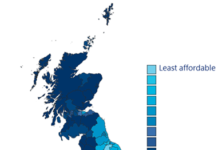The latest property market analysis by London lettings and estate agent, Benham and Reeves, has taken a look at both the residential and commercial property markets and how both are currently performing for those considering an investment but unsure which path to take.
The analysis shows that when it comes to the initial cost of investing, the average residential property requires a budget of £259,850. However, with an average value of £454,384, a commercial investment will require a budget some 75% larger on average.
Where stock availability is concerned, the residential market also offers up far greater choice with 541,966 listings versus just 12,022 across the commercial space. The value of the market is also more substantial, worth an estimated £251.5bn while the commercial market comes in at almost £9bn in value.
London and the South East rank top for resi stock availability, accounting for 19% of all listings, with the East of England (12%) also seeing a large number.
Those eyeing a commercial investment are better placed investing in the South West and North West, accounting for 12.9% and 12% of all commercial stock respectively. London ranks third with 11% of all commercial properties in the capital.
While the commercial sector may be smaller in both volume of stock and values it could prove the better option for the individual investor. On average across the UK, a commercial investment will bring a yield of 10.7%, while the average residential property offers a yield of just 3.7%.
Currently, Scotland and the North West offer the highest residential yields at 4.4% and 4.3%, while Scotland is also home to the highest commercial yield at 20.4%, along with the South West (13.7%).
Both regions are also home to the largest gap between the average residential yield and the average commercial yield.
Director of Benham and Reeves, Marc von Grundherr, commented:
“It’s fair to say that both the residential and commercial markets have been impacted by the pandemic and so it’s hard for investors to know where to put their money at present. But tough times can also bring great opportunity and with the country now reopening from both a professional and social standpoint, both sectors are set to see a return to health over the coming months.
There are a plethora of factors to consider from your initial investment level, which sector to choose and the ongoing requirements, capital gains potential, as well as the regional disparities across these sectors in each region of the UK.
While a commercial investment may offer a higher yield, the recovery timeline as a result of the pandemic is set to stretch on far longer than that of the residential rental market and residential property investment remains by far the dominant force where availability, affordability and total sector value is concerned.
However, commercial investment can provide a more hands-off approach for those doing so through a third-party platform, while the amateur buy-to-let landlord is sure to spend more time sorting out tenant issues and so on.
The best approach is a balanced portfolio and one that considers the pros and cons of each market from both a residential and commercial standpoint.”
| Table shows the current average asking price, value of the market, number of properties and proportion of total properties across both the commercial and residential markets | ||||||||
| Region | Resi number of properties | Resi asking price | Est total value | % of market | Comm number of properties | Comm asking price | Est total value | % of market |
| London | 103,471 | £1,048,760 | £108,516,245,960 | 19.1% | 1,331 | £1,526,731 | £2,032,078,961 | 11.1% |
| South East | 103,293 | £454,581 | £46,955,035,233 | 19.1% | 1,172 | £2,032,700 | £2,382,324,400 | 9.7% |
| East Midlands | 35,842 | £275,169 | £9,862,607,298 | 6.6% | 780 | £972,202 | £758,317,560 | 6.5% |
| East of England | 65,333 | £365,714 | £23,893,192,762 | 12.1% | 741 | £645,600 | £478,389,600 | 6.2% |
| North East | 22,423 | £202,181 | £4,533,504,563 | 4.1% | 783 | £347,866 | £272,379,078 | 6.5% |
| North West | 48,599 | £227,049 | £11,034,354,351 | 9.0% | 1,438 | £429,830 | £618,095,540 | 12.0% |
| South West | 49,629 | £403,642 | £20,032,348,818 | 9.2% | 1,547 | £534,867 | £827,439,249 | 12.9% |
| West Midlands | 36,619 | £289,322 | £10,594,682,318 | 6.8% | 1,175 | £478,938 | £562,752,150 | 9.8% |
| Yorkshire and The Humber | 29,099 | £201,512 | £5,863,797,688 | 5.4% | 1,152 | £330,030 | £380,194,560 | 9.6% |
| Scotland | 25,310 | £191,332 | £4,842,612,920 | 4.7% | 1,110 | £305,749 | £339,381,390 | 9.2% |
| Wales | 21,372 | £244,530 | £5,226,095,160 | 3.9% | 768 | £417,946 | £320,982,528 | 6.4% |
| Northern Ireland | 976 | £184,416 | £179,990,016 | 0.2% | 25 | £396,942 | £9,923,550 | 0.2% |
| United Kingdom | 541,966 | £259,850 | £251,534,467,087 | 100.0% | 12,022 | £454,384 | £8,982,258,566 | 100.0% |
| Table shows the current average yield across both the commercial and residential markets | ||||||
| Region | Resi asking price | Resi asking rent pm | Resi average yield | Comm asking price | Comm asking rent pm | Comm average yield |
| Scotland | £191,332 | £706 | 4.4% | £305,749 | £5,204 | 20.4% |
| South West | £403,642 | £1,031 | 3.1% | £534,867 | £6,097 | 13.7% |
| Yorkshire and The Humber | £201,512 | £633 | 3.8% | £330,030 | £3,549 | 12.9% |
| Northern Ireland | £184,416 | £277 | 1.8% | £396,942 | £3,605 | 10.9% |
| Wales | £244,530 | £806 | 4.0% | £417,946 | £3,597 | 10.3% |
| West Midlands | £289,322 | £810 | 3.4% | £478,938 | £3,692 | 9.3% |
| North East | £202,181 | £667 | 4.0% | £347,866 | £2,570 | 8.9% |
| North West | £227,049 | £810 | 4.3% | £429,830 | £3,168 | 8.8% |
| East of England | £365,714 | £1,057 | 3.5% | £645,600 | £4,377 | 8.1% |
| London | £1,048,760 | £2,643 | 3.0% | £1,526,731 | £9,681 | 7.6% |
| East Midlands | £275,169 | £802 | 3.5% | £972,202 | £5,053 | 6.2% |
| South East | £454,581 | £1,356 | 3.6% | £2,032,700 | £7,848 | 4.6% |
| United Kingdom | £302,577 | £869 | 3.4% | £317,890 | £5,204 | 19.6% |
Help keep news FREE for our readers
Supporting your local community newspaper/online news outlet is crucial now more than ever. If you believe in independent journalism, then consider making a valuable contribution by making a one-time or monthly donation. We operate in rural areas where providing unbiased news can be challenging. Read More About Supporting The West Wales Chronicle






















